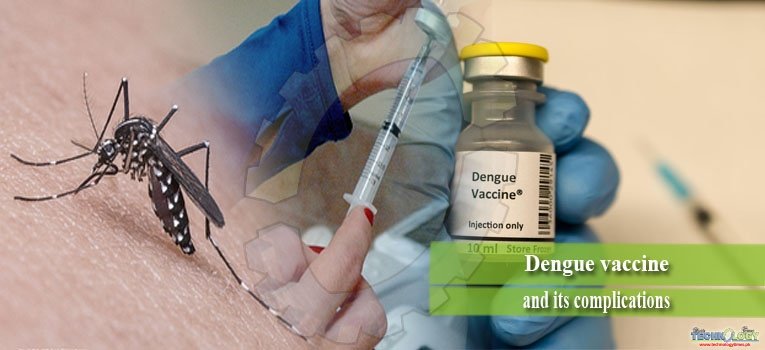In recent years, vaccine for dengue virus infection has been developed which not only stop first infection but also to prevent disease that may happen due to the presence second and third infection. A mechanism known as antibody dependent enhancement (ADE) now caused by vaccine itself.

The common clinical manifestation of dengue infection are fever, skin rash, headache, myalgia and arthritis. In extreme infections of disease hemorrhagic fever, extensive bleeding and shock also develop. When various serotypes are involved during secondary infection, chances of disease severity increase from 1 in 10,000 to 1 in 100.
Dengvaxia, a quadrivalent vaccine developed to prevent infection against all four serotypes. Clinical trials of phase 3 have showed that immunization with the vaccine prevent from primary infection and from severe disease as well.
In phase 3 of clinical trials, data has been collected upon exposure to third dose and Dengvaxia vaccine was licensed. Five year post immunization data of 32,568 vaccinated and control group of 2-16 year age reveals that chances of disease has been increased in all groups.
Mainly severe dengue happened in two groups: monotypic dengue virus immune children and vaccinated seronegative children respectively who received placebo. When third dose of vaccine has been administered. It was noticed that severe dengue has occurred during 2-4 years while 1.44 % cases were reported in 5th year and hospitalization occurred with dengue infection.
Although numbers are few but still noteworthy. So this rate of infection is not tolerable as millions of children will be vaccinated. Seropositive children having dengue vaccine were secured, although moderately from severe infection.
Approximately all children produced neutralizing antibodies against four serotypes of Dengvaxia. So the question is, why the vaccinated population was not secure from severe disease? The reason might be that the antibodies were not providing protection against ADE. While immunity against extreme dengue infection was provided by CD8+ T cells.
Dengvaxia does not provide protection by stimulating CD8+ T cells because the vaccine does not contain epitope which is recognized by these cells rather they are situated in nonstructural proteins. It is recombinant vaccine mostly constitute enveloped glycoprotein of dengue virus and proteins from yellow fever attenuated vaccine. It does not contain any nonstructural protein of dengue virus.
According to Scott Halstead, the absence of nonstructural proteins of yellow fever with that of dengue virus may disable T cell response to prevent from dengue infections.
As Dengvaxia has been linked with ADE, Philippines has prohibited the use of this product. Producer of product said that, people who are not infected with dengue virus should not use the vaccine. Countries in which this vaccine has been used followings actions should be taken.
- Usage of vaccine should be stopped.
- Vaccine should be administered to 15 years or older children as there are more chances already dengue virus infection.
- Vaccine should only be given to children who are seropositive for dengue.
So, there is a need of dengue vaccine which can prevent ADE, should be designed. NIH has developed such a vaccine named as TV003.It is a tetravalent candidate vaccine. It is modified dengue viruses which don’t cause any signs of disease. Immunization by this vaccine followed by type 2 dengue virus exposure show 100% protection to volunteers. As TV003 is purely based on dengue virus infection so CD8+ T cells provides protection against severe disease.
Muhammad Shafi Hasni1*, Muhammad Kasib Khan1, Shahzain Ali 2
- Department of Parasitology, Faculty of Veterinary Science, University of Agriculture, Faisalabad, Pakistan
- Institute of Microbiology, University of Agriculture, Faisalabad, Pakistan